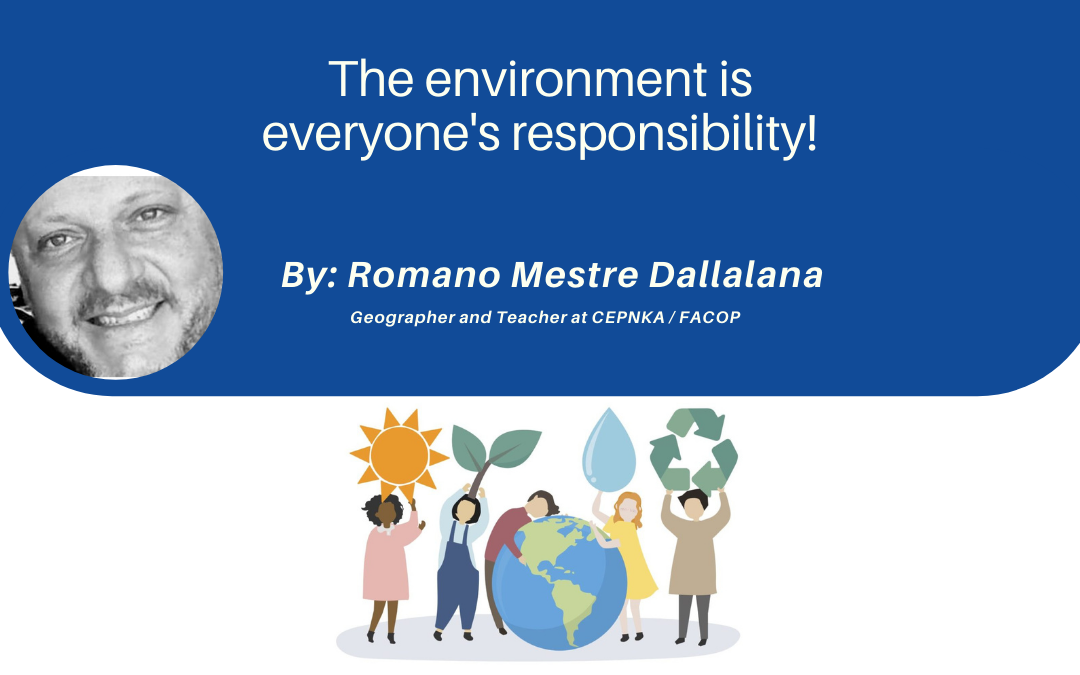No products in the cart.

The environment is everyone’s responsibility!
We live in a HOUSE the size of the WORLD. And if this residence is so big; of course we share it with other people, animals, plants and other living things. Therefore, we can say that we share the same ENVIRONMENT. And though it doesn’t seem like it, we depend on each other, like a huge house of cards. We can say that all that you can see, hear, touch, smell and feel is part of the environment. Be it natural or man made.
Man’s relationship with the environment tends to become more complete and realistic when we interact with socioeconomic issues. In doing so, the term SUSTAINABILITY was born. Sustainability is to make use of natural resources in a planned and organized manner, promoting economic development but ensuring their continuity for future generations. Thus, for something to be considered sustainable, in fact, it must be ecologically correct, socially fair and economically viable. Therefore, it is currently called Conservation and not Preservation. Preservation is something that cannot be changed, moved, visited. Conservation is something that one can enjoy, can share, but use with awareness, meaning they knowing how to use it.
Among the most common activities that we can perform in Conservation of the Environment are the so-called 3R´s practices : Recycling , Reuse and Reduction .
To illustrate the importance of the Recycling process, we take aluminum cans as an example. With this, we have reduced some “direct” environmental impacts, such as the extraction of bauxite ore (aluminum ore) and the reduction of electrical power; widely used in the processing of bauxite. In indirect impacts, this recycling keeps the cans from being disposed of in landfills or even dumps.
In Reuse , we can think of the PET bottle. Made from a type of plastic derived from petroleum, Ethylene Polyerephthalate . That, in addition to the environmental impacts inherent in oil extraction, needs energy and water to make it. Today, along with recycling, handicrafts such as PET reuse are at large: garden pots and watering cans, brooms, lamps, educational games and so on. The same PET also participates in another environmental action when collecting cooking oil. Ensuring safety and practicality in proper packaging until the proper disposal and destination.
Last but not least, Reduction in waste generation. As all actions are behavioral. This would be no different. It depends solely and exclusively on each person. When buying goods or products:
– Try to avoid disposable products and give preference to durable ones;
– Choose products with returnable packaging or ones that have refills;
– Go shopping with eco-friendly bags, which can be used many times, minimizing the number of plastic bags and buy what you really need;
– Keep some water from your washing machine in your home, it can be useful for washing sidewalks and even rinsing recyclable waste;
– Have a rainwater collection cistern for reuse in sidewalk washing, toilet flushing and gardening activities;
But in the workplace, we must also think about sustainability:
– Diluting the cleaning products properly, according to the label specifications and not “by eye”, thus avoiding the waste of water and the product itself;
– Treating machines, accessories and personal protective equipment with due care, aiming at conservation, because with durability, replacements can be made after longer periods;
– Consciously following the work plan, as if cleanliness is maintained continuously, it will not take time, energy and resources to restore the environment to make it healthy;
– Turn off the lights when leaving the room, close the taps at the end of use;
– Separate waste according to specifications and give them proper destination;
– Work with awareness, communicate assertively and maintain an ethical posture. Good examples undoubtedly contribute to a healthy environment, as conflicts are avoided and, above all, rework also facilitates interpersonal relationships.
There are several actions we can do to conserve the environment. As long as we can reduce the shipment of recyclable/reusable solid waste to landfills, while we can separate cooking oil and lamps and give them the right destination, we will minimize environmental impacts.
Every little action we do has an impact on the world. So we propose: come with us, respect the environment? Come to FACOP.

